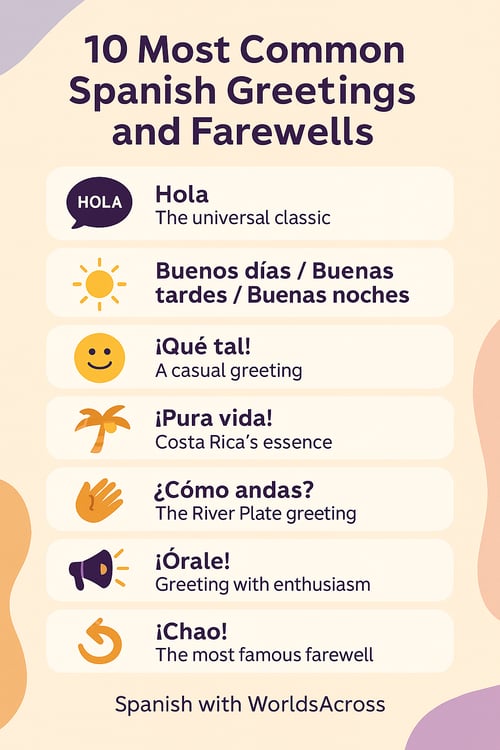10 Most Common Greetings and Farewells in Spanish

You don’t need to be an expert in Spanish to know that Hola and Chao are the most common ways to greet and say goodbye. While these two words do their job perfectly and are widely accepted in almost any setting, there are many other expressions that more accurately reflect the warmth and closeness so typical of Spanish speakers. Join us and discover the 10 most common Spanish greetings and farewells—both general and country-specific!
-
Hola – The universal classic
Of course, topping the list of Spanish greetings is the famous Hola. This greeting never fails—it's quick, simple, can be used in both formal and informal contexts, and best of all: it works in every country, even in non-Spanish-speaking ones!
-
Buenos días / Buenas tardes / Buenas noches
If you’re someone who prefers a more respectful way of greeting, these three expressions are for you. Buenos días is used in the morning, Buenas tardes in the afternoon, and Buenas noches at night. Keep in mind that these are more formal greetings, so they’re ideal when addressing older people, strangers, or in important settings like a work meeting.
-
¡Qué tal! – A casual greeting
The famous ¡Qué tal! is one of the friendliest and most popular Spanish greetings. It sounds like a question, but in reality, it’s just an informal way to say hello. For example, imagine you run into a friend you haven’t seen in a while and say: “Hey! ¡Qué tal!” That’s likely the start of a warm and enjoyable conversation. Use it and see for yourself!
-
¡Pura vida! – Costa Rica’s essence
If you ever get the chance to visit Costa Rica, instead of saying the typical Hola, say: ¡Pura vida! For Costa Ricans, this cheerful phrase is more than a greeting—it reflects their optimism and laid-back attitude. The best part? It works as both a greeting and a farewell. Awesome!
-
¿Cómo andas? – The River Plate greeting
Just like Costa Rica, Argentina and Uruguay have their own characteristic greeting. In these countries, instead of asking ¿Cómo estás?, people say ¿Cómo andas? This phrase reflects the relaxed and friendly nature of Argentinians. Just remember to use it in informal settings—it’s perfect for friends or family.

-
¡Órale! – Greeting with enthusiasm
Mexico couldn’t be left off this list of Spanish greetings. Full of spirit and friendly energy, ¡Órale! is a versatile phrase that encourages action in multiple ways. It can mean “come on!”, “let’s go!”, and of course, “hello!” If you enjoy starting informal conversations with enthusiasm, add this phrase to your collection!
-
¡Chao! – The most famous farewell
Let’s kick off the list of Spanish farewells with the popular ¡Chao! Like Hola, Chao is quick and simple, and you’ll be able to use it throughout Latin America. You might also hear variations like chau or chaito. Just remember that Chao and its variations are informal farewells, perfect for friendly situations. Avoid them in very formal contexts.
-
¡Hasta luego! / ¡Hasta pronto!
These two expressions are extremely common in Spanish-speaking cultures. What’s interesting is that they strike a balance between formality and friendliness. For example, if you’re at work and want to say goodbye respectfully, you can use either one. And if you’re at a family or friends gathering and want to maintain warmth and closeness, they’re also perfect!
-
¡Nos vemos!
Without a doubt, ¡Nos vemos! is another classic Spanish farewell. It’s great for ending conversations on a friendly and warm note, while also letting the other person know you hope to see them again soon. Some common variations are: Nos vemos pronto, Nos vemos por ahí, and Nos estamos viendo.
-
¡Cuídate! / ¡Que te vaya bien!
What better way to end a meeting or conversation than by letting someone know you care about them? Expressions like cuídate or que te vaya bien are not just friendly ways to say goodbye—they’re also powerful tools to show genuine concern and interest. More than just farewells, these words strengthen bonds between people, showing care and affection. Every time we use them, we send a clear message: we value the other person and wish them well.
The way we understand Spanish greetings and farewells changes when we realize that, beyond starting or ending conversations, these expressions are a powerful opportunity to connect authentically and meaningfully with others. Whether you go with a classic Hola or try out an Argentinian-style ¿Cómo andas?, the most important thing is to say it with confidence and a smile. Remember, good greetings lead to good conversations—and good farewells make sure they happen again. ¡Hasta la próxima!





